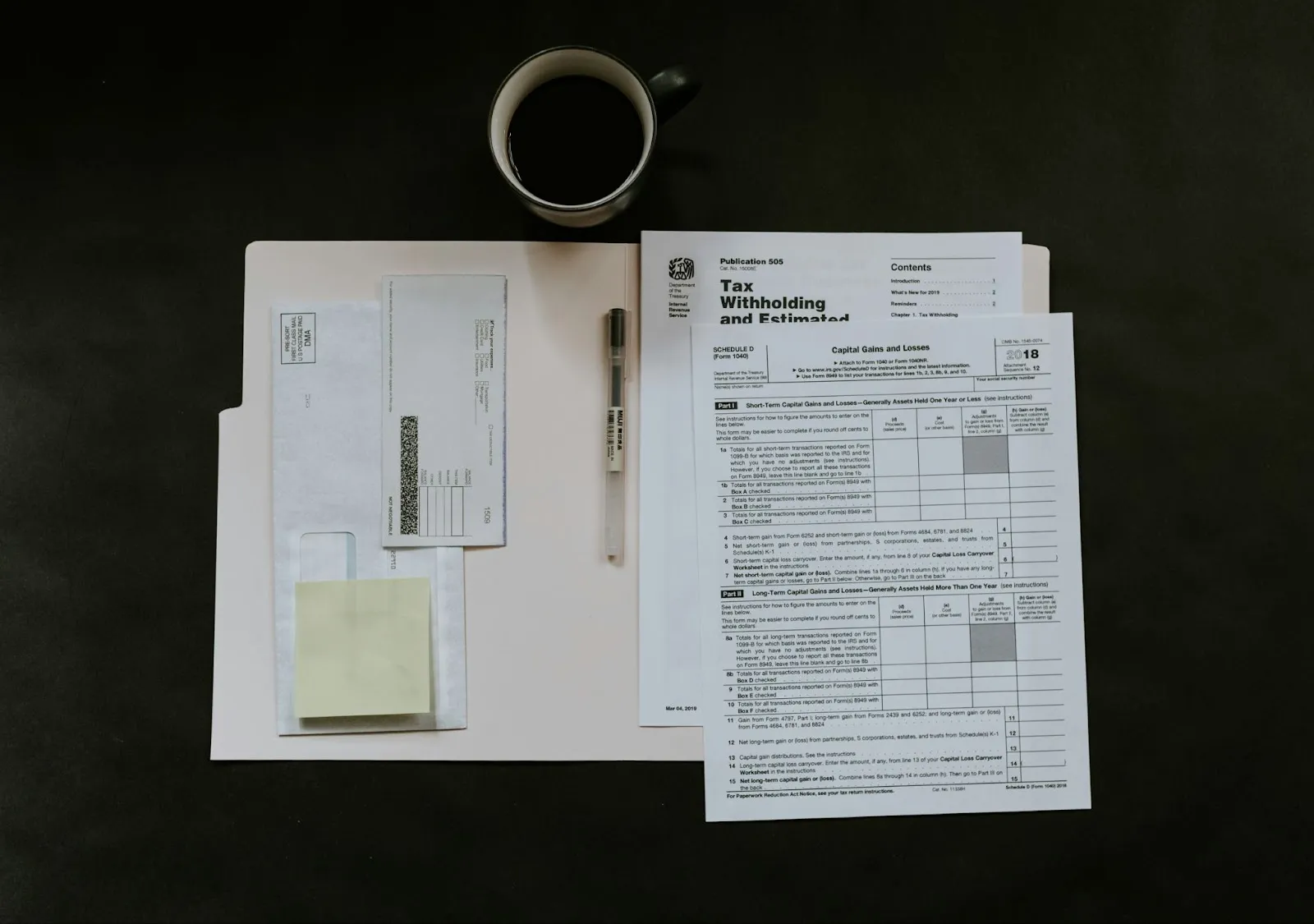
Editorial Disclaimer
This content is published for general information and editorial purposes only. It does not constitute financial, investment, or legal advice, nor should it be relied upon as such. Any mention of companies, platforms, or services does not imply endorsement or recommendation. We are not affiliated with, nor do we accept responsibility for, any third-party entities referenced. Financial markets and company circumstances can change rapidly. Readers should perform their own independent research and seek professional advice before making any financial or investment decisions.
Being self-employed, managing your finances can be daunting. This money management checklist helps you organize your finances, specifically for self-employment. From separating personal and business expenses to planning for taxes and retirement, you’ll find practical steps to ensure your financial health.

One of the first steps to achieving financial independence as a self-employed person and sole proprietor is to separate your own business and personal finances. Maintaining distinct personal and business accounts simplifies the tracking of cash flow and ensures an accurate financial overview. This separation is not just a matter of convenience but a cornerstone of effective accounting, especially during tax preparation.
Separating business and personal expenses allows for accurate tracking of deductible business costs, making it easier to claim tax deductions and benefits. A dedicated business account also protects personal assets from potential legal liabilities associated with your business.
Separating finances offers several benefits:
This step builds a solid foundation for financial security and long-term business success, whether you are a small business owner or work as a freelancer.
A detailed budget is vital for managing freelance finances. Important considerations include:
Create a monthly plan to project income and expenses accurately by following these steps:
A strong budget is one of the most important pillars of self-employed finance, as it not only helps you manage day-to-day costs but also prepares you for income fluctuations.
By understanding your earning patterns, you can allocate resources more effectively, set aside money for taxes, and invest in tools or services that grow your business. This kind of proactive budgeting can mean the difference between struggling to make ends meet and thriving as your own boss.
Accurate income and expense tracking is crucial for maintaining business records and simplifying taxes. Use expense tracking apps, spreadsheets, or handwritten ledgers. Digital tools can automate categorisation and ensure all deductible expenses are claimed.
Reviewing calendar appointments regularly can jog your memory about potential untracked deductions, ensuring thorough financial records. This meticulous tracking aids in tax preparation and provides a clear financial overview.
Consistently monitoring cash flow helps identify patterns and make informed financial decisions. This diligence leads to tax savings and achieving financial goals.
Building an emergency fund is crucial for freelancers facing irregular income. It helps manage unexpected costs like medical bills or equipment repairs, alleviating financial stress and boosting productivity.
Aim to save three to six months’ worth of living expenses in an emergency fund. Set aside a portion of each payment to grow your savings, regularly contributing to the emergency fund.
To manage your finances effectively:

Tax planning is crucial for self-employment. Key points include:
Paying estimated taxes quarterly aligns tax pay payments with the income cycle, helping manage cash flow. Avoid underpayment penalties from the IRS by staying on top of tax obligations for the tax year, ensuring financial security.
Consulting a tax professional optimises tax savings and ensures accurate filings. They assist in maximizing deductions, helping retain more earnings and reduce taxes. This proactive tax planning ensures long-term financial success.
If unpaid estimated taxes accumulate and the IRS files a Notice of Federal Tax Lien, act quickly to protect your business credit and assets. Options like lien release, withdrawal, or subordination may apply depending on your repayment plan and compliance status. For guidance tailored to self-employed professionals, consult IRS tax lien removal services provided by experienced tax attorneys who negotiate with the IRS and help resolve liens and related levies.
For example, many self-employed professionals also work with solicitors in Melbourne to get guidance on legal aspects of structuring their business, drafting contracts, and ensuring tax compliance. Having both financial and legal advisors can give you a stronger foundation, especially if your business is growing or you’re dealing with more complex client agreements.
Setting financial goals motivates better budgeting practices. Clear objectives direct spending and saving, prioritising what’s most important. A balanced goal-setting approach addresses immediate needs and future aspirations.
Financial goals can be short-term, like saving for a vacation, or long-term, like retirement planning. A financial plan with specific, measurable goals helps monitor progress and make adjustments as circumstances and market conditions evolve.
If part of your plan includes paying off debt, it’s wise to include clear tips to manage your loan within your broader money strategy. This could mean prioritising higher-interest loans first, consolidating debt to lower your payments, or setting up automatic repayments to avoid missed deadlines.
Not only does this reduce interest costs over time, but it also frees up more of your income for savings, investments, and other financial goals. By aligning debt repayment with your budget and cash flow, you can steadily improve your overall financial health.
Saving for retirement is crucial for self-employed individuals to secure financial stability in later years. Contributions up to 25% of net earnings can be made to a SEP plan, with annual limits reaching $69,000 for 2024.
The contribution limits for various retirement plans in 2024 are:
Consult a financial advisor for tailored guidance. Saving for retirement ensures a comfortable and secure future.
Freelancers should frequently assess their budgets to align with changing financial situations and goals. Adjust the budget for income fluctuations or unexpected expenses. Regular evaluation helps identify ways to cut costs or investment opportunities.
Automating savings simplifies budgeting and encourages consistency. Regular budget reviews and adjustments are essential for staying on track financially, ensuring your plan remains effective and aligned with your goals.
Hiring a tax professional offers several benefits:
Effective financial planning through professional advice sets you up for future success as a self-employed individual. Investing in professional advice helps navigate the complexities of self-employment finances with confidence.
Digital tools like Expensify offer automated expense tracking, invoicing, and mileage logging. Expense management software organises business expenses and saves time during tax preparation. Features like automatic receipt scanning and real-time categorisation benefit self-employed individuals.
Mint connects users with over 17,000 financial institutions for comprehensive transaction tracking. Monthly insights help users understand their spending habits effectively.
Financial tools and apps streamline personal finance management for self-employed individuals, significantly aiding in tax season preparation by keeping money expenses organised.
Self-employed individuals can claim deductible expenses like travel, meals, and business equipment to reduce taxable income. Business-related travel expenses, including transportation, lodging, and meals, are generally deductible if necessary and ordinary. Car expenses related to business use can be deducted using the actual expense method or the annually updated standard mileage rate.
Self-employed persons can deduct 50% of meal costs directly related to business activities under specific conditions. Home office expenses can be claimed if the space is used regularly and exclusively for business purposes, calculated using actual expenses or a simplified method based on square footage.
Proper documentation, including amount, date, merchant name, business purpose, and receipt, is required to deduct business expenses on a tax return.
Self-employed individuals have several options and benefits regarding health coverage:
Self-employed individuals and self employed people can qualify for premium tax credits based on estimated net income when applying for health coverage. They can also qualify for a Special Enrollment Period to enroll in a health plan if they lose job-based coverage.
Accurately estimating income on a Marketplace application is crucial for determining savings options. Prioritizing health insurance protects self-employed individuals and their families from high medical costs.
In summary, organising your finances as a self-employed individual involves several crucial steps, including separating business and personal finances, creating a detailed budget, tracking income and expenses, and planning for taxes.
Building an emergency fund, setting financial goals, saving for retirement, and regularly reviewing your budget are essential for financial stability. Investing in professional advice and utilizing financial tools can further streamline your financial management. By understanding deductible expenses and preparing for health insurance, you can protect your financial well-being and achieve long-term success.
Separating your finances is a foundational step for any self-employed individual. It makes tracking your business's profitability much clearer, simplifies tax preparation by keeping deductible expenses distinct, and protects your personal assets if your business faces legal issues. It also presents a more professional image to clients.
Because self-employed income can be irregular, a robust emergency fund is vital. The general recommendation is to save three to six months' worth of essential living expenses. This cushion covers you during slow periods or for unexpected costs without forcing you into debt.
Unlike traditional employment where tax is deducted automatically, you are responsible for paying your own. You'll typically need to pay estimated taxes to HMRC in quarterly instalments based on your projected annual income. It's a good idea to set aside a percentage of every payment you receive specifically for your tax bill. Consulting a tax professional can be very helpful here.
Since you don't have an employer-sponsored pension, you need to set up your own. Popular options in the UK include a Self-Invested Personal Pension (SIPP), which offers a wide range of investment choices, or a standard personal pension. The key is to start contributing early and consistently to build a secure future.
Absolutely. Modern financial apps and software can automate many tedious tasks. They can track your income and expenses, categorise spending, scan receipts for tax purposes, and help you create and stick to a budget. Using these tools saves you significant time and helps you make more informed financial decisions.